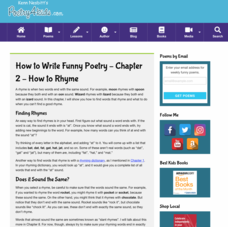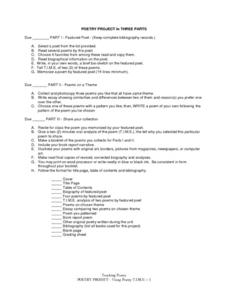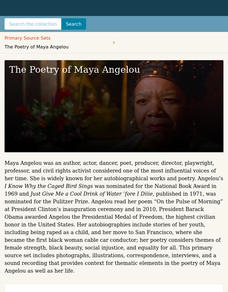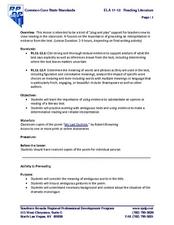Curated OER
Figurative Language Project
Want a handy way to remember the difference between metaphors and similes, or allusions and alliteration? Individuals craft their own figurative language booklet, complete with definitions, examples, and illustrations, following...
Poetry4kids
How to Write an Exaggeration Poem
The best poetry writing lesson of all time is here for you! Learn all about the art of exaggeration with a lesson on exaggeration poems, which instructs students to use wild imagery to convey their message.
Texas Education Agency (TEA)
How to Read and Analyze a Poem (English III Reading)
A poem is compressed speech, like a can of frozen juice with all the water pressed out. An interactive teaches users how to reconstitute the language, the structure, and the literary devices to appreciate all the subtleties the poet...
Curated OER
Short Poems Are Scary!
What do all those chairs and pencils do in the classroom once everyone leaves? Allow imaginations to run wild with frighteningly short poems!
Poetry4kids
How to Write an Alliteration Poem
Learners follow five steps to compose an alliteration poem. They choose one consonant and brainstorm as many nouns, verbs, and adjectives they can think of to create rhyming sentences that come together in a poetic fashion.
Curated OER
7th Grade Poetry Project
Ask your pupils to explore the sounds, forms, and language of poetry by putting together a portfolio of their own work. In a binder, learners collect the poems listed on the second page of the assignment sheet. Each individual creates a...
Novelinks
Tuck Everlasting: Similes, Metaphors, and Personification in Imagery
Poetic language is abundant in Natalie Babbitt's beautiful novel, Tuck Everlasting. Learners note the examples of similes, metaphors, and personification they find as they read, and illustrate how the language creates a sensory...
Poetry4kids
How to Write Funny Poetry — Chapter 2: How to Rhyme
Funny poems don't have to rhyme—but it helps! Learn how to use rhyming words to add humor to funny, clever, or just plain silly poems.
Texas Education Agency (TEA)
Simile and Metaphor (English III Reading)
The key idea in this interactive exercise designed for high schoolers is that figurative language, especially similes, and metaphors, add layers of meaning to a text. Users examine examples from speeches, ads, movie dialogue, and poems,...
Teaching English
Poetry Project in Three Parts
It’s poetry T.I.M.E! Individuals use the T.I.M.E. format (T = Title, thought, and theme; I = Imagery and figurative language; M = music and sound; E = emotion) to study a poet, collect poems that have a similar theme, and create a...
Curated OER
Poetry Project
Choosing a poet or a theme, eighth graders conduct research in the world of poetry. They conduct Internet research and select five poems that fit their poet or theme, and create a seven slide PowerPoint presentation on their selected...
Harper Collins
The Giving Tree Anniversary Teaching Guide
Celebrate poetry month all of April with a guide that uses six of Shel Silverstein's most famous books as a basis for the lessons. Discussion questions and writing activities are provided for each of Silverstein's books.
Digital Public Library of America
The Poetry of Maya Angelou
Maya Angelou's work reflects her passion for life, civil rights, and justice for all. A collection of 12 primary sources provide scholars with insight into this amazing woman. The set includes photographs, articles, recordings of...
Curated OER
The Old Man and the Sea: Guided Imagery
What do you imagine when you think of the sea? Put on some ocean sounds, close your eyes, and listen to a guided meditation based on the imagery from The Old Man and the Sea by Ernest Hemingway. After class members listen to...
National Endowment for the Humanities
The Beauty of Anglo-Saxon Poetry: A Prelude to Beowulf
Riddle me this! What do kennings, caesura, and alliteration have to do with the Nowell Codex? Introduce class members to Anglo-Saxon poetry and prepare readers for a study of Beowulf with a series of activities that...
Shmoop
ELA.CCSS.ELA-Literacy.L.11-12.5
"Timid, scared, terrified." High school scholars examine words, their denotations and connotations, in a series of exercises that use lines from Shakespeare to explore figurative language and word relationships. Participants then...
Laura Candler
Bio Poems Made Easy
A creative way bring autobiographical writing to your poetry unit or back-to-school curriculum, this lesson plan guides you through a bio poem activity. Kids use the graphic organizer to describe themselves using adjectives, things...
Teach It Primary
The Pied Piper of Hamelin
Six tasks make up a lesson plan designed to reinforce comprehension and language skills using the poem "The Pied Piper" by Robert Browing. Scholars discuss and define unknown words, identify adjectives and onomatopoeia, review...
Poetry4kids
How to Write a Clerihew
Writing funny poems is the best part about learning poetic forms! Young poets learn all about clerihews—humorous four-line poems about people—with an explanatory lesson.
Texas Education Agency (TEA)
Paradox (English III Reading)
Pairs of contradictory words introduce learners to paradoxes, the literary device writers use to get readers thinking deeply about their messages. An interactive lesson uses poems by Emily Dickinson and Wilfred Owen and excerpts from the...
Southern Nevada Regional Professional Development Program
Reading Literature - My Last Dutchess
Draw back the curtain, add a spot of joy to your class, and let learners be lessoned by a close reading exercise that models how to develop an interpretation based on evidence drawn from a text. Robert Browning’s dramatic monologue “My...
Southern Nevada Regional Professional Development Program
Reading Literature - The Ruin
Cross-comparison, the technique of focusing on two different texts with the same themes, motifs, events, etc., is employed in an exercise that asks groups to examine two different translations of “The Ruin,” a poem, written in Old...
Fabius-Pompey School District
Paired Passage Practice and the Extended Response Question
How do pupils relate paired passages to each other? Here's a resource that helps! The lesson includes a short story and a poem as a set of paired reading passages, followed by some analysis questions. It also includes an essay template...
Novelinks
Tuck Everlasting: Bio-Poem
Learn about the characters of Natalie Babbitt's Tuck Everlasting with a character biopoem. Readers fill in a poem format to detail the character traits of Winnie, Jesse, Miles, and Mae, and share their finished poems...























